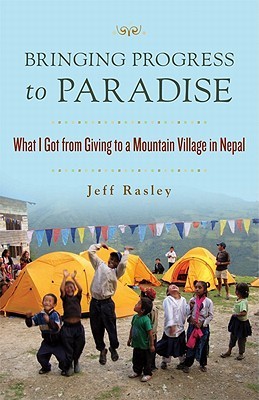
An excerpt from Bringing Progress to Paradise: What I Got from Giving to a Mountain Village in Nepal, by Jeff Rasley, published by Midsummer Books, 2023.
We were five ghostly figures in swirling snow, standing atopthe 15,000-foot Zatwra La. Early morning rays of sun crept over and down the flank of the great white peak behind us. Wind blowing from the north made it hard to hear the others. Heather shouted over the hushing wind, “We’ve got to spread out!” But Tom insisted we should stay close together. All our rope was with our porters, who were slogging up the pass an hour or so behind us. Suddenly, Heather yelped and took off running. Tom cursed. Seth bellowed, “Go, run!” And then I heard the low distant roar that mountain climbers dread.
We took off down the pass with Heather in the lead. Judy cried out and fell down. Tom and Seth grabbed her arms, pulling her up, yelling at her, “Run! Run!”
I saw them out of the corner of my eye as I pounded mechanically down the rocky, snow-covered slope, stumbling into and over boulders hidden by snow. My consciousness was a gray crackling static. I knew my ability to think and respond was impaired by altitude sickness. All I felt was an instinctive drive to keep running, to get off this mountain, to survive.
The roar of the avalanche above and behind us was replaced by an eerie whirring sound. Spindrift came over us, stark white and opaque. I could barely see my gloves and boots. But the avalanche had petered out. We fell to our knees gasping. We looked up into a vast whiteness.
~~~~~~~
The avalanche struck when our team was hiking out from base camp after a failed attempt to climb 21,224-foot Mera Peak in the fall of 1999 in the Solu-Khumbu region of Nepal. Fifteen climbing teams spent most of the first week of October stuck in base camp or high camp. With unrelenting snow and terrible visibility, conditions were too tough to make a summit attempt. During my team’s eleven-day trek to the Mera base camp at 16,000 feet, we were rained on every day until we got above 14,000 feet. From then on, it snowed every day.
The trek was surrealistic, over high mountain passes, across rushing glacier-fed streams. We slipped and slid through a muddy bamboo forest and past the remains of a village destroyed the year before by an avalanche. Everything—our gear, boots, clothes—was soaking wet by the time we got above the rain, camping then in snow and ice. Our progress was slowed after that by having to slog through deep snow. After four days enduring heavy snows and blizzard conditions in base camp and high camp, our team gave up. I spent the last day on the mountain in a tent by myself, retching and wretched with altitude sickness and a sinus infection.
Snow continued to fall as our defeated and bedraggled team finally hiked out of base camp. At sunrise on the second day of the hike out, our tents sagged under five inches of new snow that had fallen during the night. Snow continued falling as we ate breakfast, packed gear, and then trudged 2,000 feet up the backside of the 15,000-foot pass called Zatrwa La. This was the last high pass to cross to escape the menace of avalanche from the great white-capped Himalayan peaks and to reach Lukla village, where a Twin Otter airplane was scheduled to fly us back to Katmandu. By the time we postholed up to the crest of the pass, fresh snow was over two feet deep. The conditions were perfect for an avalanche: fresh, deep, and unstable snow.
Barely visible through the falling snow on a ridge above and behind us were splotches of red and yellow—the down parkas of three Nepalese porters from another climbing expedition that was following us out of the mountains. The three Nepalese guys were inching their way across the ridge, slowed by the blowing snow and the heavy loads they were carrying.
When the avalanche struck, my team was on the crest of the Zatwra La trying to decide how to descend the steep 4,000-foot slope. The avalanche came down off a mountain shoulder well above and behind us, but right above the three Nepalese porters. They vanished in the gigantic wave of the avalanche. It wasn’t until we were safely back in Lukla village that we learned the porters had been killed, along with four others who died in a series of avalanches across the Nepal-Tibetan Himalaya that same week of October 1999.
Of those seven deaths, only one garnered international headlines, that of the famous mountaineer Alex Lowe on Shishapangma in Tibet. If the deaths of six Nepalese porters in the avalanches were noted at all, it was as a footnote to the loss of a great Western mountaineer.
The three porters I saw enveloped in the death grip of the avalanche were known to me only as workers for another climbing expedition of Western adventurers. They lost their lives carrying heavy loads while taking a higher, harder shortcut out of base camp to get their employers’ gear to Lukla before the climbers arrived.
~~~~~~~
The arc of this story begins with three being enveloped in an avalanche of death and ends in three being enveloped in an avalanche of love in a village called Basa.
